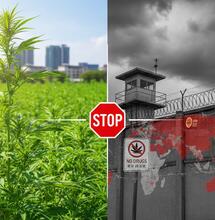Market Correction in Canada is Already Happening

Latest data from Canadian cannabis regulators shows that a record number of shops have closed across the country during 2023. In some of the provinces, such as in Alberta, it’s the first time since legalization that the number of cannabis retail licenses canceled or not renewed exceeded the number of new store licenses issued. In other provinces, there’s an obvious drop in new business applicants.
The Canadian cannabis market has struggled with oversaturation in the last three years. An excess of licensing in the country’s three largest provinces, Alberta, British Columbia and Ontario, has created a stiff competition strain for businesses.
New data from 2023 indicates that correction of the market density in Canada is already underway. This can be seen in the numbers of business owners opting out from operations and lower interest to obtain a license for running a cannabis store.
More Than 50 Weed Shops Closed in Alberta
Last year, more cannabis shops closed than they opened in Canada’s Alberta province. Only 48 new cannabis dispensary licenses were issued in 2023, while 62 dispensary licenses were canceled or not renewed, according to a report from MjBizDaily.
Just a year before, in 2022, the situation in Alberta was much different. The province regulators issued 140 new dispensary licenses, while 73 were canceled or not renewed by license holders, writes MjBizDaily.
Alberta entered 2024 with 749 cannabis outlets in total, and represents the country’s best established province market. Industry insiders believe that it makes sense to see the number of cannabis stores drop in a market such as Alberta.
“As long as the cancellation number stays high, to me that says there’s still an imbalance,” Matt Maurer, chair of the Cannabis Law Group at Torkin Manes in Toronto, told the MjBizDaily in a phone interview.
Once balanced, Maurer believes that there would follow only a few cancellations a year. “Until we see those numbers drop further on the cancellations, it’s still a sign there’s oversaturation,” he said.
In Maurer’s view, the number of store exits may have to do more with reasons specific to the stores, rather than something with the industry itself.
On another note, data about expired or canceled licenses should only be seen as a rough assessment on store exits. It’s data that does not account for everything and all that plays out in a market. For instance, it does not account for license dormancy.
Ontario and British Columbia Also on Correction Path
In Ontario, Canada’s most profitable market, the data suggests that there are still more cannabis shops entering business rather than exiting. However, the number of new store applicants in Ontario have been going down a third year in a row.
The Alcohol and Gambling Commission of Ontario (AGCO), the body which acts as a regulator in the province, received merely 269 applications in 2023, which is in stark contrast with the 1,000+ applications the bureau got in 2021.
In British Columbia, it’s the number of new cannabis licenses approved seeing a decline. Back in 2021, the province regulators granted almost 100 licenses for opening new cannabis shops, and last year they issued only 47.
All of these numbers may be as well seen as a sign of market maturation. It may indicate that entrepreneurs now approach the cannabis sector with more wisdom about where, when and if they should open a (new) shop at all.
Canada International Weed Exports Under Scrutiny
As the most significant part of the Canadian cannabis market is going through adjustment period and probably entering a new phase, the country’s exports sector has also been in the focus since mid-January, when Israeli authorities launched an “anti-dumping” investigation on their medical marijuana imports from Canada.
The Middle East country, which is Canada's biggest cannabis client, claimed that there is a causal link between the imports and damage done to Israel’s domestic cannabis producers. An investigation took off after Israeli companies experienced huge financial losses because they allegedly failed to compete with cheap Canadian imports.
In 2023, Canada exported roughly 21,000 kilograms (21 tons) of cannabis to Israel for commercial and scientific use, according to data from Health Canada. The Canadian authorities have since expressed disappointment on Israel's decision to investigate their trade deal.
Also read on Soft Secrets:
- Canada Five Years Into Legalization
- Record Quantities of Legal Weed Destroyed in Canada
- Canadian Regulators Don't Want Words Like ‘Soda’ and ‘Cola’ on Weed Labels














